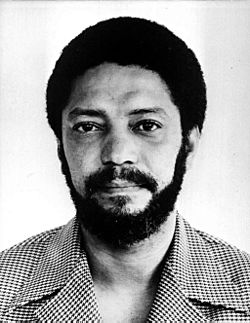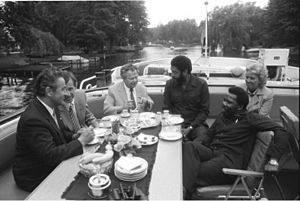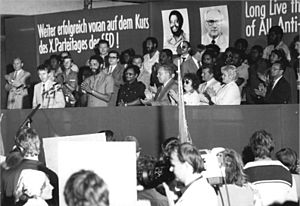Maurice Bishop facts for kids
Quick facts for kids
Maurice Bishop
|
|
|---|---|

Bishop in Saxony, East Germany
11 June 1982 |
|
| 2nd Prime Minister of Grenada (People's Revolutionary Government) |
|
| In office 13 March 1979 – 16 October 1983 |
|
| Monarch | Elizabeth II |
| Governor General | Sir Paul Scoon (powers limited) |
| Deputy | Bernard Coard |
| Preceded by | Sir Eric Gairy |
| Succeeded by | Bernard Coard |
| Personal details | |
| Born |
Maurice Rupert Bishop
29 May 1944 Aruba, Curaçao and Dependencies |
| Died | 19 October 1983 (aged 39) Fort Rupert, St. George's, Grenada |
| Cause of death | Execution by firing squad |
| Political party | New Jewel Movement |
| Spouse |
Angela Redhead
(m. 1966) |
| Domestic partner | Jacqueline Creft |
| Children | Nadia (born 1969) John (born 1971) Vladimir Creft (1978–1994) |
| Education | London School of Economics King's College London |
Maurice Rupert Bishop (born May 29, 1944 – died October 19, 1983) was a Grenadian leader and revolutionary. He led the New Jewel Movement, a political party focused on improving society, education, and equality. His party came to power on March 13, 1979, after removing the previous leader, Eric Gairy.
Bishop became the head of the People's Revolutionary Government of Grenada. He served from 1979 until 1983. He was removed from his position and tragically died during a political event led by Bernard Coard. This event caused a lot of trouble in Grenada.
Contents
Maurice Bishop's Early Life
Maurice Rupert Bishop was born on May 29, 1944, on the island of Aruba. At that time, Aruba was a Dutch colony. His parents, Rupert and Alimenta Bishop, came from Grenada. His father worked hard to support the family.
Maurice lived in Aruba with his two older sisters until he was six years old. In 1950, his family moved back to Grenada. His father opened a small shop in the capital city, St. George's. Maurice went to school there. He was a very bright student.
For high school, Bishop earned a scholarship to Presentation Brothers' College. He was a leader there, becoming president of the Student Council. He also edited the school newspaper and loved studying history and politics. He was very interested in the idea of Caribbean unity and the 1959 Cuban Revolution. He admired leaders like Fidel Castro and Che Guevara.
In 1962, Bishop graduated with top honors. Around that time, he and his friend Bernard Coard started a youth group. They wanted to get young people involved in discussing important issues. Maurice was known for his strong speaking skills and his ability to use humor.
Political Journey
Studying in England
In December 1963, Maurice Bishop went to London to study law at the University of London. His friend Coard went to study in the United States. In London, Bishop earned his law degree in 1966. He often worked part-time jobs to support himself.
While studying, Bishop became interested in Grenadian history. He also joined groups fighting against racial discrimination. He even traveled to socialist countries like Czechoslovakia and East Germany. During this time, he read many books about political ideas, including those by Marx and Lenin. He was especially inspired by Julius Nyerere's ideas on socialism.
After finishing his studies, Bishop helped start a free legal aid office in London. This office helped people from the West Indies community. He planned to return to Grenada and work as a lawyer while also helping to build a political organization.
Returning to Grenada
Bishop returned to Grenada in December 1970. He immediately got involved in helping people. He defended nurses who were on strike to improve patient care. He was arrested during a protest but was later found not guilty.
In 1972, Bishop helped organize a conference to discuss liberation movements. He also helped create the Movement for Assemblies of the People (MAP). This group wanted to involve ordinary people in making decisions for the country.
In January 1973, MAP joined with another group called JEWEL. Together, they formed the New Jewel Movement (NJM). Bishop became a joint leader of this new movement.
Challenging the Government
On November 18, 1973, Bishop and other NJM leaders were stopped by security forces. They were arrested and beaten. This event became known as "Bloody Sunday" in Grenada.
On January 21, 1974, Bishop joined a large protest against the Premier, Eric Gairy. During the protest, Gairy's supporters attacked the group. Maurice's father, Rupert Bishop, was shot and killed while trying to protect women and children. This sad day was called "Bloody Monday." After this, Bishop and his friends realized they needed a new plan to gain support among workers and rural people.
On February 6, 1974, just before Grenada became independent, Bishop was arrested again. He was accused of planning a conspiracy. He was released on bail and later traveled to the United States. He continued his work as a lawyer, defending people accused of crimes.
In 1976, Bishop was elected to Parliament. From 1976 to 1979, he was the Leader of the Opposition. He spoke out against Prime Minister Eric Gairy's government, which faced accusations of unfair practices. In May 1977, Bishop visited Cuba for the first time.
Becoming Prime Minister

In 1979, while Eric Gairy was out of the country, Bishop's party led a revolution. They removed Gairy from power, and Bishop became the Prime Minister of Grenada. He then suspended the country's constitution.
As Prime Minister, Bishop built a strong relationship with Cuba. He started many projects to help Grenada. The most important was building a new international airport on the island. Cuba provided money and workers for this project. The airport was designed by experts from Europe and North America.
Bishop believed strongly in the rights of workers and women. He also fought against racism. Under his leadership, the National Women's Organization was created. This group helped make important decisions. Women were given equal pay and paid time off for maternity leave. It became illegal to treat people differently because of their gender.
Organizations were also set up for education, health care, and youth. Bishop's government made progress in these areas. For example, the number of people who couldn't read dropped a lot. Unemployment also went down.
However, Bishop's government did not hold elections. They also limited the free press and silenced those who disagreed with them. Bishop explained that he believed true democracy meant people having basic rights like jobs, housing, and food. He felt that elections could be influenced by money from outside the country. He wanted to make sure the economy was stable and more people had benefited from the revolution before holding elections.
Arrest and Death
In 1983, disagreements began among the leaders of Bishop's party. A group within the party, led by Deputy Prime Minister Bernard Coard, wanted Bishop to share power or step down. Bishop refused these ideas.
In early October 1983, Bishop was removed from his position and placed under house arrest by Coard's group. Many people across the island protested and demanded Bishop's freedom. During one protest, a large crowd freed Bishop from house arrest.
Bishop then went to the army headquarters at Fort Rupert (now called Fort George). Soon after he arrived, a military force came from another fort. Bishop and seven other people, including some of his government ministers, were captured. A firing squad from the People's Revolutionary Army then executed Bishop and the others.
After Bishop's death, several Caribbean countries asked the United States for help. The Governor-General of Grenada, Sir Paul Scoon, also appealed for assistance. As a result, U.S. President Ronald Reagan launched an invasion of Grenada.
Family Life
Maurice Bishop married Angela Redhead, a nurse, in 1966. They had two children, Nadia (born 1969) and John (born 1971). Angela and the children moved to Canada in 1981.
Bishop also had a son, Vladimir Creft (1978–1994), with his partner Jacqueline Creft. Jacqueline Creft was Grenada's Minister of Education. She was killed alongside Bishop on October 19, 1983. After his parents died, Vladimir moved to Canada to live with his half-siblings. Sadly, Vladimir also died in Toronto.
Bishop's Legacy
In 2009, Grenada's international airport was renamed Maurice Bishop International Airport in his honor. This was a way to remember his contributions to the country. The Prime Minister of St. Vincent and the Grenadines, Ralph Gonsalves, spoke at the ceremony. He said that this honor would help bring closure to a difficult time in Grenada's history.
See also
 In Spanish: Maurice Bishop para niños
In Spanish: Maurice Bishop para niños
- Grenada 17
 | DeHart Hubbard |
 | Wilma Rudolph |
 | Jesse Owens |
 | Jackie Joyner-Kersee |
 | Major Taylor |


